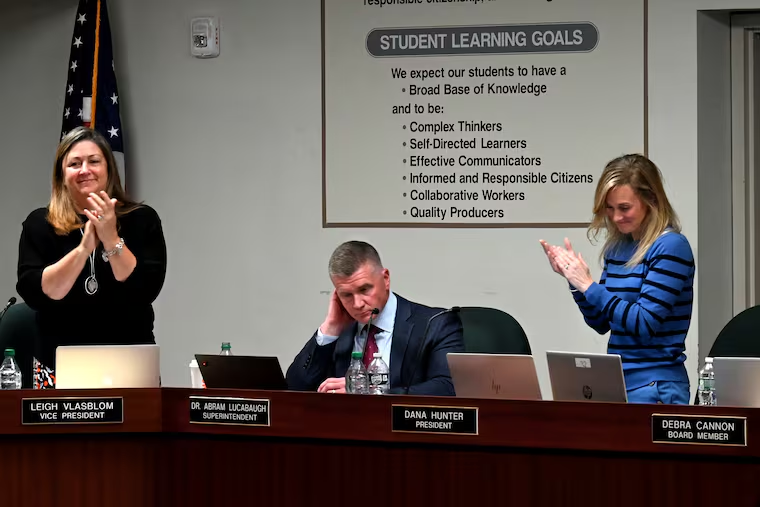We voted to ban Pride flags in Central Bucks classrooms because students should be taught how to think, not what to think
Yes, Policy 321 prevents teachers from hanging Pride flags in their classrooms. But it also bans antiabortion posters, or any advocating for a particular partisan, political, or social policy issue.

We represent the majority of the elected members of the Board of School Directors for the Central Bucks School District. Recently, our board enacted a districtwide policy entitled “Partisan, Political, or Social Policy Advocacy Activities,” or Policy 321. This policy takes politics out of the classroom and provides an inclusive environment for all district students.
But the nature of the policy has been deeply misrepresented by its opponents. Focusing only on its impact on symbols such as Pride flags, critics have labeled it as an “anti-LGBTQ crusade.” This is false. We, the six majority members of the school board, wish to set the record straight on the rationale for the policy and what it does and does not do.
The policy is based on universal, undeniable principles. Most importantly, students learn best when they learn how to think, not what to think. That sort of critical thinking will equip them for a successful future. Accordingly, the classroom should be a place of education, not indoctrination. And that can occur only when teachers check their politics at the door when instructing students by not advocating their own personal views on partisan, political, or social policy issues.
“The classroom should be a place of education, not indoctrination.”
We believe the best teaching occurs when teachers’ personal views on such issues are not obvious to students — because then students are challenged to examine complex issues from all angles and think analytically in order to draw their own conclusions.
At this point, you might be thinking — well, of course, this is common sense. Isn’t that the way all reasonable people think classrooms should operate? So why does the district need a “policy” about it?
It is true, fortunately, that most classrooms in our district follow these universal principles. But some do not. To see the need for the policy, look no further than the reaction to the policy from a small but vocal segment of the community.
For example, when Superintendent Abram Lucabaugh scheduled a meeting with teachers to discuss the policy and answer questions about it, some teachers and students boycotted the meeting and held an outdoor protest last week — replete with bullhorns, signs, flags, and banners. They gave interviews with the media that spread misinformation about the policy; one recent article claimed the policy would ban discussion of certain topics in the classroom, which is not true. The three members of the school board who voted against the policy authored an op-ed for The Inquirer that claimed the policy was “an inventory of restrictions on intellectual and personal freedoms.”
» READ MORE: Central Bucks board denies discrimination allegations, moves forward on policy that ACLU warns hurts LGBTQ students
To the contrary, the policy does not ban discussion of any topics, nor does it regulate student speech at all. It simply says that teachers cannot use their position of authority to advocate for one side of a partisan, political, or social policy issue. Thus, the policy promotes a robust discussion from multiple angles on all topics that are related to the curriculum. Consequently, the policy prohibits decorating classrooms with flags, banners, posters, and the like for the purpose of advocating on partisan, political, or social issues. But the policy does not target any particular issue. It applies neutrally and equally to prohibit all partisan, political, and social policy advocacy, regardless of the issue.
So yes, Policy 321 prevents teachers from hanging Pride flags in their classrooms. But it also bans antiabortion banners, or any poster advocating for a particular partisan, political, or social policy issue, unless related to the day’s curriculum.
We understand that the policy upsets some advocates. It upsets some teachers who want to advocate their personal views in the classroom; it upsets some students who agree with those views; it upsets some community activists who want to see their views championed in the classroom; it upsets some elements of the press who agree with those views; and it upsets the three board members who voted against the policy. But this outcry merely demonstrates the urgent need for the policy. Without it, partisan activity would abound in some classrooms.
As some national politicians like to say: Elections have consequences. The same principle applies to the Central Bucks School District. We, the majority members of the school board, were elected to put the community’s wishes into action. Some of us made these issues part of our campaigns to be members of the school board and were elected; we are simply upholding the campaign promises that the majority of voters wanted.
We have a responsibility to ensure that our district classrooms foster an optimal learning environment and atmosphere of inclusiveness, free from partisan advocacy. That is our job, and we are proud to do it. Our oath requires no less.
Debra Cannon, Sharon Collopy, Dana Hunter, James Pepper, Lisa Sciscio, and Leigh Vlasblom are members of the Board of School Directors for the Central Bucks School District.